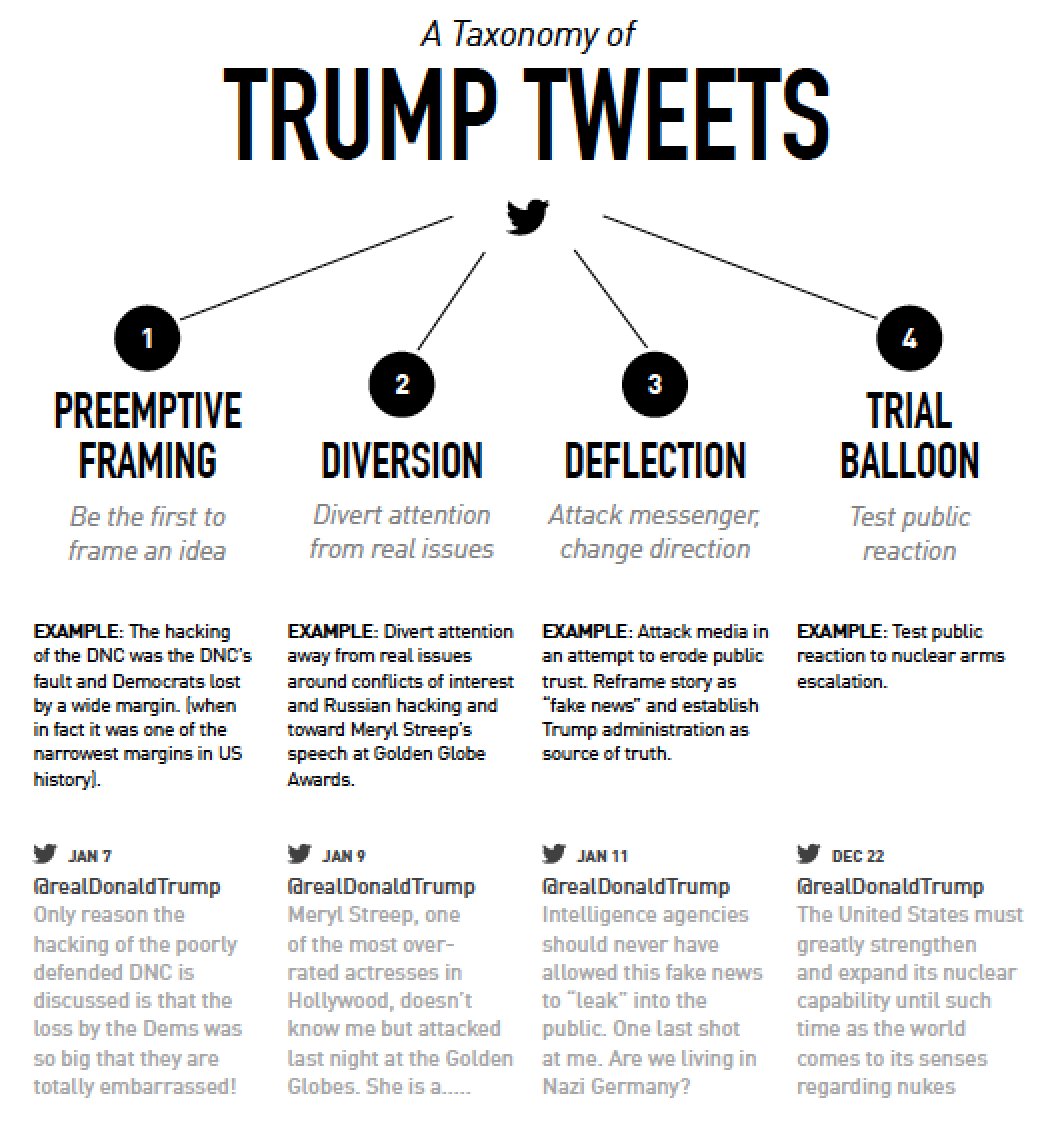(I will be adding to this post as the semester progresses...)
For a sociolinguist, President Trump's tweets are a treasure trove of linguistic oddities. There are several traits he has become known for:
Here are a few brief (some informative, some entertaining, some both) news stories focusing on his use of language, both spoken and written. (I'll be adding to this collection as the semester progresses.)
For a sociolinguist, President Trump's tweets are a treasure trove of linguistic oddities. There are several traits he has become known for:
- the use of nicknames (I have a separate post on this)
- the use of superlatives (best, smartest, greatest, biggest, etc.)
- "Nobody has been tougher on Russia than me."
- "Nobody builds better wall than I do."
- “I know words...https://news.liverpool.ac.uk/2018/01/19/one-year-trump-linguistics-expert-analyses-us-presidents-influence-language/https://qz.com/1153080/trump-tweets-analyzed-by-linguists-reveal-five-characteristics/I have the best words.”
- the use of negative hyperbole
- "The worst FBI director in our history"
- "They will be met with fire and fury like the world has never seen.”
- "The worst trade deal ever made."
- a lack of complex vocabulary, favoring a small set of words used over and over, such as the frequent use of "Sad!"
- the use of future progressive tense
- "You're going to be seeing..."
- "We're going to be looking at..."
- "They're going to be asking..."
- the use of hedges, or backtracking
- “Hillary wants to abolish, essentially abolish the Second Amendment.”
- "Certainly there was meddling. Probably there was meddling from other countries."
- the use of apophasis, which is a figure of speech typically used to bring up a taboo subject by either denying it or pretending to pass over it:
- “I was going to say ‘dummy’ Bush; I won’t say it. I won’t say it,”
- “I promised I would not say that she ran Hewlett-Packard into the ground, that she laid off tens of thousands of people and she got viciously fired. I said I will not say it, so I will not say it.”
- the use of parataxis and/or hyptotaxis, which is the stringing of simple clauses together in a jumble (a run-on sentence):
- "...my uncle was a great professor and scientist and engineer, Dr. John Trump at M.I.T.; good genes, very good genes, O.K., very smart, the Wharton School of finance, very good, very smart – you know, if you're a conservative Republican, if I were a liberal, if, like, okay, if I ran as a liberal Democrat, they would say I'm one of the smartest people anywhere in the world – it’s true! – but when you're a conservative Republican they try – oh, they do a number – that’s why I always start off: "Went to Wharton, was a good student, went there, went there, did this, built a fortune”– you know I have to give my life credentials all the time, because we're a little disadvantaged – but you look at the nuclear deal, the thing that really bothers me …
- the use of vague sentences with no antecedent
- "When you look at what they've been doing, it's very unfair." (What exactly is he referring to? Who are THEY?)
- "When you see what they've been doing over there.." (who and what?)
- "Everybody's saying it..." (who?)
Here are a few brief (some informative, some entertaining, some both) news stories focusing on his use of language, both spoken and written. (I'll be adding to this collection as the semester progresses.)
- Jeannie Moos of CNN:
- Trump's Curious Case of Going with Uppercase: https://www.cnn.com/videos/politics/2018/05/07/capital-trump-twitter-moos-pkg.cnn
- Trump's Typos: https://www.cnn.com/videos/politics/2018/03/21/donald-trump-tweet-typos-moos-pkg-erin.cnn
- (from a guest on Anderson Cooper's 360) Trump's use of forceful and easy-to-remember phrases with two words, often mono-syllabic:
- "fake news"
- "witch hunt"
- "deep state"
- "Spy-gate"
- "not good"
- "fire & fury"
- "believe me"
- NOTE: One study found that 78% of Trump's words are monosyllabic
More linguistic analysis you might find interesting:
- A fascinating set of "word clouds": https://www.nbcnews.com/politics/2016-election/donald
- https://www.vox.com/policy-and-politics/2017/1/11/14238274/trumps-speaking-style-press-conference-linguists-explaintrump-s-campaign-tweets-n593846
- https://www.washingtonpost.com/news/the-fix/wp/2017/07/07/this-linguist-studied-the-way-trump-speaks-for-two-years-heres-what-she-found/?utm_term=.f9b6444f44f0
- https://qz.com/1153080/trump-tweets-analyzed-by-linguists-reveal-five-characteristics/
- https://www.cnn.com/2017/04/21/politics/donald-trump-president-speeches-favorite-phrases-trnd/index.html
- Linguist George Lakoff: https://www.fastcompany.com/90155999/graphic-trumps-tweets-can-be-reduced-to-4-rhetorical-strategies (see graphic below)

